

Connecting the Digital Dots: Literacy of the 21st Century. Viewpoint Connecting the Digital Dots: Literacy of the 21st Century Literacy today depends on understanding the multiple media that make up our high-tech reality and developing the skills to use them effectively By Barbara R.
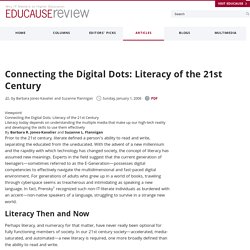
Jones-Kavalier and Suzanne L. Flannigan Prior to the 21st century, literate defined a person’s ability to read and write, separating the educated from the uneducated. Literacy Then and Now Perhaps literacy, and numeracy for that matter, have never really been optional for fully functioning members of society. Was it always so? Digital and visual literacies are the next wave of communication specialization. The New Literacy and Education Our research suggests that the lack of education related to literacy is problematic, and the situation is exacerbated in the field of education. Taking precedence over systematic planning is the trial-and-error approach to using technology in the classroom, specifically for nontechnical courses such as English or fine arts. Endnotes 1. 5 tips to improve your critical thinking - Samantha Agoos. History of Critical Thinking “The intellectual roots of critical thinking are as ancient as its etymology, traceable, ultimately, to the teaching practice and vision of Socrates 2,500 years ago who discovered by a method of probing questioning that people could not rationally justify their confident claims to knowledge.
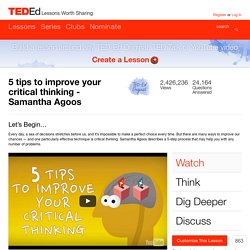
Confused meanings, inadequate evidence, or self-contradictory beliefs often lurked beneath smooth but largely empty rhetoric.” “He [Socrates] established the importance of seeking evidence, closely examining reasoning and assumptions, analyzing basic concepts, and tracing out implications not only of what is said but of what is done as well. His method of questioning is now known as "Socratic Questioning" and is the best known critical thinking teaching strategy.
In his mode of questioning, Socrates highlighted the need in thinking for clarity and logical consistency.” Soft o hard ecco le abilità che il mercato del lavoro sta cercando « Professional Blog ♦ ♦ Counseling Solutions. PREPARA IL TUO COCKTAILOgni azienda quando deve decidere chi assumere fra una rosa di candidati cerca il candidato con quel mix di abilità,esperienza e know how del settore di riferimento nel quale opera.
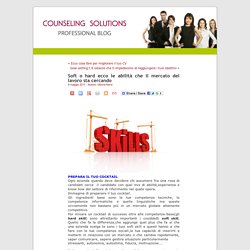
Immagina di preparare il tuo cocktail. Gli ingredienti base sono le tue competenze tecniche, le competenze informatiche e quelle linguistiche ma queste ovviamente non bastano più in un mercato globale altamente competitivo. Per mixare un cocktail di successo oltre alle competenze-base(gli hard skill) sono altrettanto importanti i cosiddetti soft skill. Soft Skills: cosa sono e come si valutano? Di Mario Catani Sembra ormai essere un dato di fatto quello che le aziende ricerchino nei collaboratori competenze definibili “intangibili” quali disponibilità, flessibilità, voglia di imparare e siano meglio disposte a colmare eventuali lacune nelle competenze tecniche con interventi di formazione.
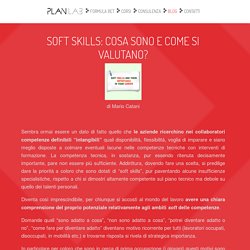
La competenza tecnica, in sostanza, pur essendo ritenuta decisamente importante, pare non essere più sufficiente. Addirittura, dovendo fare una scelta, si predilige dare la priorità a coloro che sono dotati di “soft skills”, pur paventando alcune insufficienze specialistiche, rispetto a chi si dimostri altamente competente sul piano tecnico ma debole su quello dei talenti personali. Diventa così imprescindibile, per chiunque si accosti al mondo del lavoro avere una chiara comprensione del proprio potenziale relativamente agli ambiti soft delle competenze. In particolare per coloro che sono in cerca di prima occupazione (i giovani) questi motivi sono fonte di notevole preoccupazione perché: What is soft skills? - Definition from WhatIs.com. Soft skills is a synonym for "people skills.
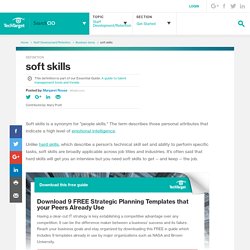
" The term describes those personal attributes that indicate a high level of emotional intelligence. Unlike hard skills, which describe a person's technical skill set and ability to perform specific tasks, soft skills are broadly applicable across job titles and industries. It's often said that hard skills will get you an interview but you need soft skills to get -- and keep -- the job. By submitting your personal information, you agree that TechTarget and its partners may contact you regarding relevant content, products and special offers.
You also agree that your personal information may be transferred and processed in the United States, and that you have read and agree to the Terms of Use and the Privacy Policy. The attributes of soft skills Good manners, optimism, common sense, a sense of humor, empathy and the ability to collaborate and negotiate are all important soft skills. Another important soft skill is adaptability. Margaret Rouse asks: 6 Soft Skills to Improve Your Career & How to Boost Them.